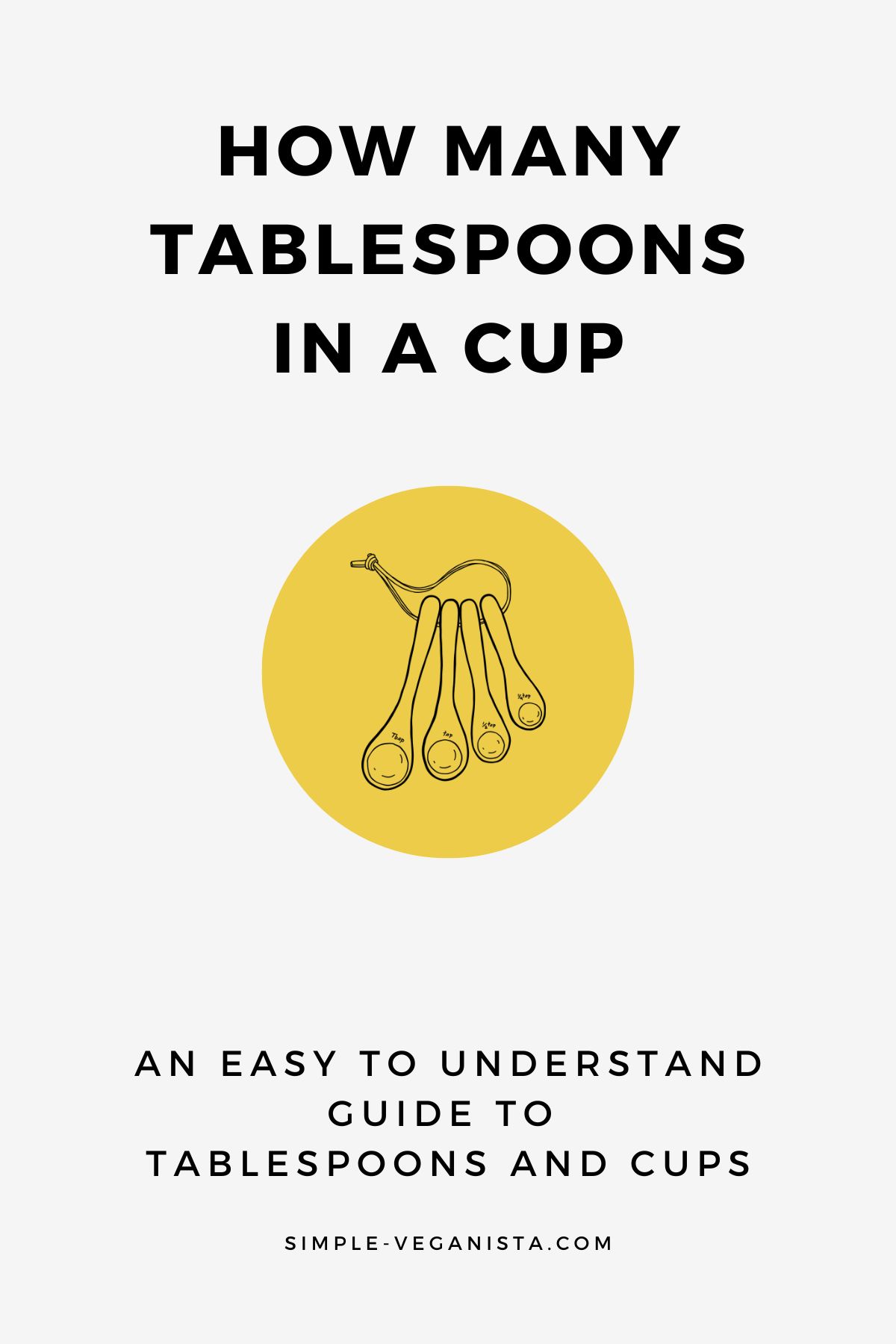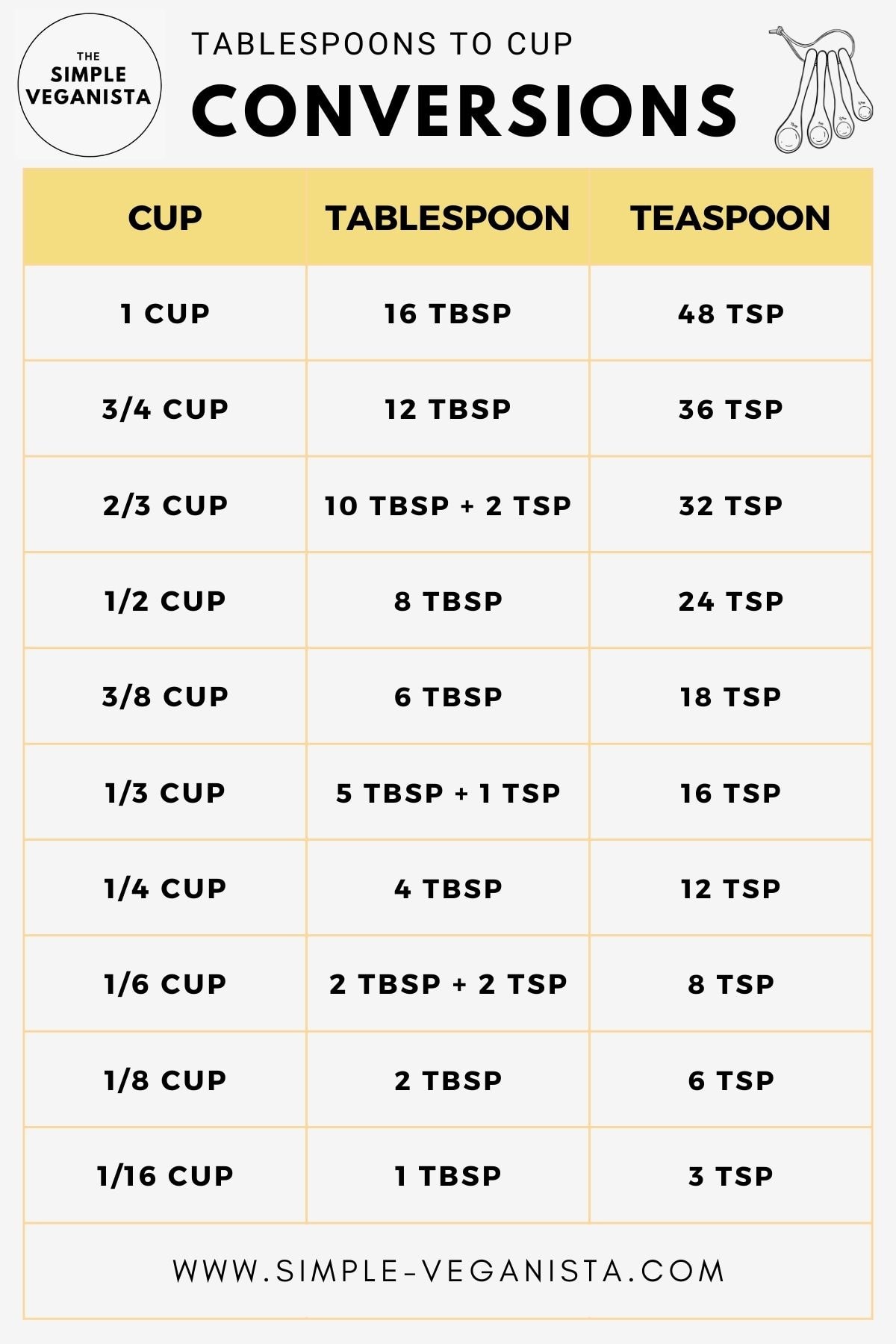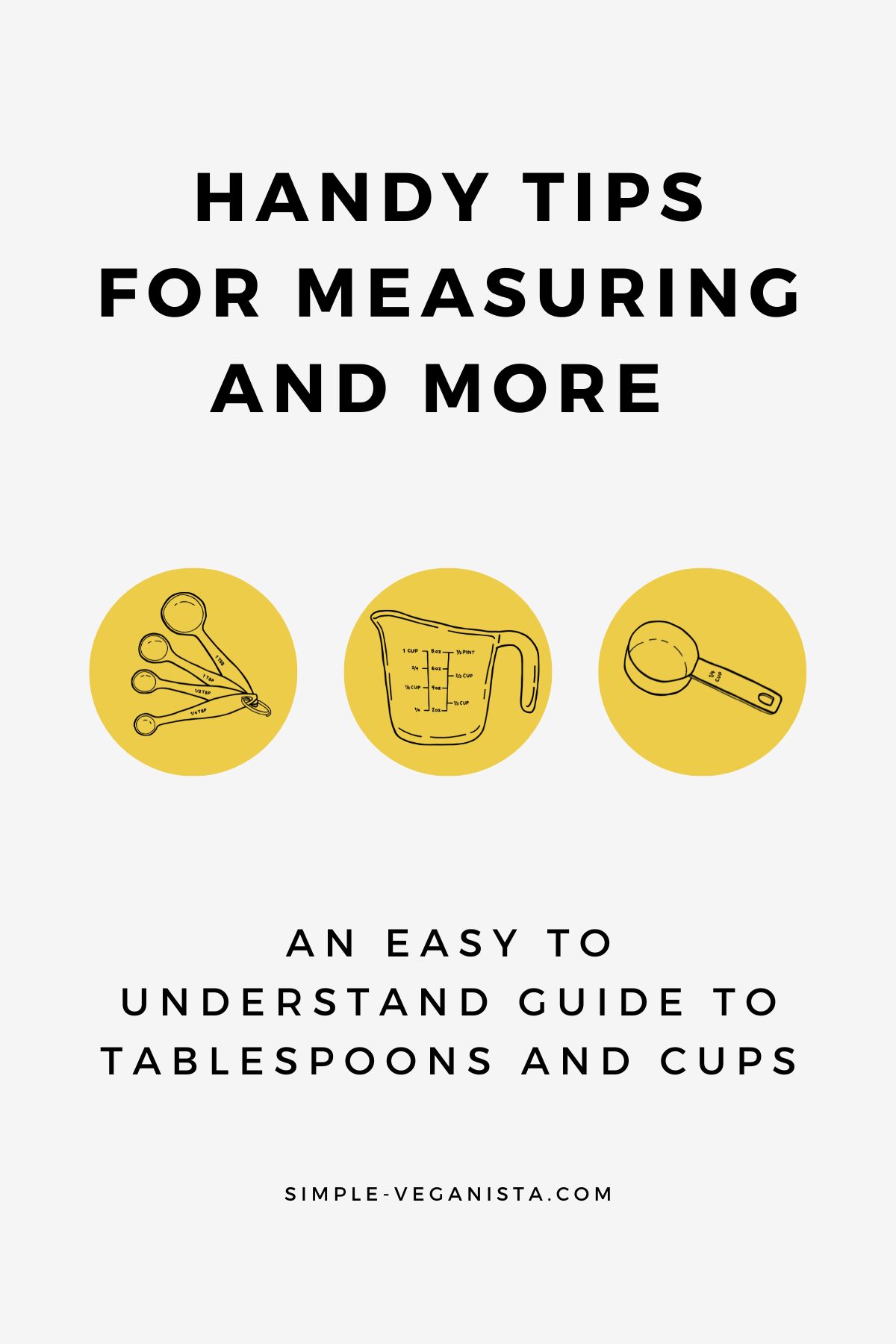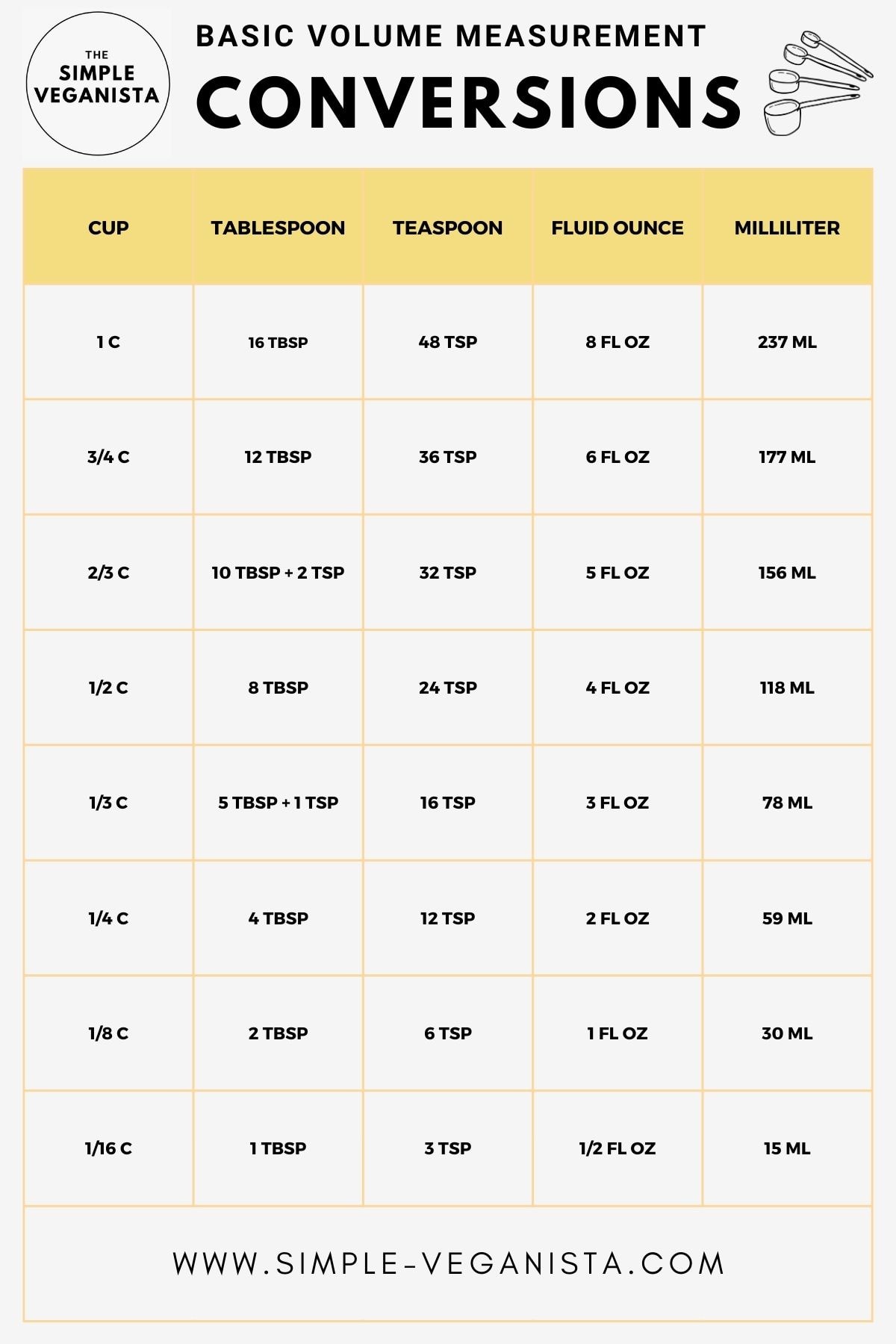How Many Tablespoons in a Cup (Tbsp to C)
How many tablespoons are in a cup? Accurate measurements are key for creating delicious and consistent dishes in both cooking and baking. This handy guide will help you master basic measurements in the kitchen!

Mastering correct measurements in cooking and baking is essential for achieving consistent results, avoiding waste of ingredients, and enhancing the flavor and texture of dishes.
I’m sharing with you all things tablespoons and cups while learning how to convert them and tips for measuring ingredients accurately. Plus, we share common mistakes and how to avoid them!
So let’s get to it and become better cooks and bakers in the end. 🧑🍳
Also, see How Many Ounces in a Gallon and How Many Grams in an Ounce.
What is a Tablespoon?
A tablespoon, abbreviated as Tbsp, tbsp, Tb, or T, is a unit of volume commonly used in cooking to measure ingredients like spices, sugar, oils, and liquid condiments. One tablespoon is equivalent to 1/2 fluid ounce, three teaspoons, or 15 milliliters.
- 1 tbsp = 1/16 of a cup
- 1 tbsp = 3 tsp
- 1 tbsp = 15 ml
- 1 tbsp = 1/2 fl oz
What is a Cup?
A cup, abbreviated as C or c, is a unit of volume used to measure larger quantities of ingredients like flour, sugar, and liquids. One cup is equivalent to 16 tbsp, 8 fl oz., or 237 milliliters.
- 1 cup = 16 tbsp
- 1 cup = 48 tsp
- 1 cup = 237 ml
- 1 cup = 8 fl oz
US Standard, US Legal, and Metric Cup
Let’s quickly cover the different types of cups. The primary difference between the US Standard (customary) cup, US legal cup, and metric cup is their volume. These units are used for measuring liquid and dry ingredients in cooking and baking.
- US Standard (customary) cup: The US customary cup is commonly used in the United States for recipes and cooking measurements. It is equivalent to 8 US fluid ounces or approximately 236.59 milliliters.
- US legal cup: The US legal cup is primarily used for nutrition labeling purposes in the United States by organizations like the FDA and USDA. It is a standardized unit defined as exactly 240 milliliters. The legal cup is slightly larger than the US customary cup and ensures consistency in nutrition facts labeling.
- Metric cup: The metric cup is a unit of volume measurement used in countries that follow the metric system. It is not an official SI unit but is commonly used in cooking and recipes in some countries. The metric cup is defined as 250 milliliters.
It’s important to know what system you’re using when making a recipe. Although the difference between the US customary and metric cup-to-tablespoon measurement isn’t huge, it can make a difference when scaling a recipe. Here is a breakdown:
1 US Cup = 16 US tablespoons (tbsp)
1 US Cup = 15.77 metric tablespoons
Wet vs. Dry Tablespoons and Cups
When it comes to the art of measuring ingredients, there’s no distinction between “wet” and “dry” tablespoons and cups as a unit of measurement. A tablespoon is a tablespoon, and a cup is a cup, whether you’re measuring liquids or dry ingredients.
Just be sure to follow the suggested wet and dry measurement tips (as shown below) for accuracy!
How Many Tablespoons are in a cup?
In one standard cup, there are 16 tablespoons. This unit conversion can also be expressed as 16 tablespoons = 1 cup, 16 T = 1 c, or 1 c = 16 Tbsp. However you write it, there are always 16 tablespoons in 1 customary cup.
And remember, it doesn’t matter what the ingredient is – there are always 16 tablespoons in 1 standard cup!
This conversion comes in handy when you’re measuring ingredients in the kitchen and need to switch between these two units. Happy cooking!
Here are the most common tablespoon-to-cup conversions for recipes and baking:
- 1 tablespoon (tbsp) = 1/16 cup (c)
- 2 tablespoons (tbsp) = 1/8 cup (c)
- 4 tablespoons (tbsp) = 1/4 cup (c)
- 5 tablespoons (tbsp) + 1 teaspoon (tsp) = 1/3 cup (c)
- 6 tablespoons (tbsp) = 3/8 cup (c)
- 8 tablespoons (tbsp) = 1/2 cup (c)
- 10 tablespoons (tbsp) + 2 teaspoons (tsp) = 2/3 cup (c)
- 12 tablespoons (tbsp) = 3/4 cup (c)
- 16 tablespoons (tbsp) = 1 cup (c)
Here’s a straightforward table to help you convert tablespoons (Tbsp) to cups (c):
| Tablespoons | Cups |
|---|---|
| 1 tbsp | 1/16 c |
| 2 tbsp | 1/8 c |
| 3 tbsp | 3/16 c |
| 4 tbsp | 1/4 c |
| 5 tbsp | 5/16 c |
| 6 tbsp | 3/8 c |
| 7 tbsp | 7/16 c |
| 8 tbsp | 1/2 c |
| 9 tbsp | 9/16 c |
| 10 tbsp | 5/8 c |
| 11 tbsp | 11/16 c |
| 12 tbsp | 3/4 c |
| 13 tbsp | 13/16 c |
| 14 tbsp | 7/8 c |
| 15 tbsp | 15/16 c |
| 16 tbsp | 1 c |
Here is a simple Tbsp to C conversion chart with common kitchen measurements you can pin 📌 or save for later reference:

Mathematical Formula
The conversion formula for tablespoons in a cup is straightforward:
1 cup = 16 tablespoons
(➗) How To Convert Tablespoons to Cups (Tbsp to C)
To convert tablespoons to cups, divide the number of tablespoons by 16.
For example, if a recipe calls for 1 cup of flour, you can use the conversion factor to determine that you need 16 tablespoons of flour.
Here is the formula for converting tablespoons to cups:
Cups = Tablespoons ➗ 16
(✖️) How To Convert Cups To Tablespoons (C to Tbsp)
To convert cups to tablespoons, multiply the number of cups by 16.
For example, if you have 2 cups, you would multiply 2 c x 16 tbsp to get 32 tablespoons.
Here is the formula for converting cups to tablespoons:
Tablespoons = Cups ✖️ 16
Converting Other Measurement Units
Here are some of the most commonly used measurements with simple conversions:
- Teaspoons to tablespoons: 1 tablespoon = 3 teaspoons.
- Tablespoons to fluid ounces: 1 fluid ounce = 2 tablespoons.
- Cups to pints, quarts, and gallons: 2 cups = 1 pint, 4 cups = 1 quart, and 16 cups = 1 gallon.
- Fluid ounces to cups: 8 fluid ounces = 1 cup
For converting between the US customary system and metric system, common conversions such as 1 cup = 240 ml can be helpful. Online converters offer quick and easy conversions when needed.

Understanding Basic Measurement Units
Familiarizing yourself with common units of measurement is the foundation for successful cooking and baking!
- Teaspoons (tsp) are the smallest unit for measuring volume and are commonly used for spices, extracts, and leavening agents.
- Tablespoons (tbsp) are three times larger than a teaspoon and are ideal for measuring butter, oil, and sugar.
- Cups (c) serve as larger volume measurements for ingredients like flour, milk, and vegetables.
- Fluid ounces (fl oz) are used for measuring liquid volumes like water, juice, and syrup.
- Milliliters (ml) and liters (L) are metric system units for measuring volume commonly used outside the US. Recognizing the differences between the US customary and metric systems is crucial when working with international recipes.
- Volume measurements refer to the space an ingredient occupies, while weight measurements refer to its mass. Some recipes use weight measurements (e.g., grams or ounces) for better accuracy.
Tips for Accurate Measuring
Here are some practical tips for accurate measuring in the kitchen and beyond!
Selecting the Right Measuring Tools
Here is a breakdown of handy tools to have in your kitchen:
- Measuring spoons: Use measuring tablespoons and teaspoons for small amounts, such as spices, leavening agents, and small amounts of liquids.
- Measuring cups: For larger dry ingredients such as flour, sugar, and oats measuring cups come in different sizes and are easy to use.
- Liquid measuring cups: When measuring liquid ingredients such as water, milk, or juice, liquid measuring cups are perfect since they have a spout and handle for easy pouring and minimal spillage.
- Digital kitchen scale: A digital scale is precise and easy to use when measuring ingredients by weight.
Measuring Dry Ingredients
For accurate measurement, especially with flour, simply scoop the dry ingredient into the measuring spoon and level it off with a straight-edged utensil, such as a knife or spatula. This ensures a consistent amount of the dry ingredient every time.
Adjusting Measurements for Altitude
High-altitude baking and cooking may require adjustments to ingredient measurements, as well as oven temperature and baking time. Consult high-altitude cooking resources for guidance.
Common Measurement Mistakes and How to Avoid Them
Using the wrong measurement tools can lead to mistakes. Investing in a quality set of measuring spoons, cups, and a digital scale is a good idea.
Over-packing or under-packing dry ingredients can lead to inconsistent results. To avoid this, spoon ingredients into measuring cups and level off the top.
Not leveling off ingredients can result in imprecise measurements, so always use a straight-edged utensil to level off ingredients.
Measuring liquids at eye level ensures accuracy. Fill the measuring cup to the intended measurement line, and place it on a flat surface to ensure it isn’t under or overfilled.
📌 Tablespoon to Cup Conversion Chart (US + Metric)
Here is a handy chart to help you easily convert between tablespoons, cups, and more for US and Metric measurements!
Pin it for later 📌

Converting Recipes from Different Countries
Understanding regional differences in measurements is important when converting international recipes. Keep in mind that the US customary system and metric system can differ significantly.
Tips for converting international recipes include using online converters, using measurement conversion charts, and being aware of regional ingredient variations.
Luckily, many recipe sites, mine included, have a toggle in the recipe card to convert to grams, making it a better experience!
FAQ’s
How many tablespoons are in a cup of butter?
A cup of butter contains 16 tablespoons. Butter is usually sold in 1/2 cup (8 tablespoons) or 1 cup (16 tablespoons) sticks, making it easy to measure the amount needed for a recipe.
How many tablespoons are in a cup of sugar?
There are 16 tablespoons in a cup of sugar. It’s helpful to remember that regardless of the ingredient being measured, cane sugar, powdered sugar, or coconut sugar, there is always 16 tbsp in a cup.
How many tablespoons are in a cup of flour?
There are 16 tablespoons in a cup of flour. This is the same for any type of flour.
How many tablespoons in a cup of coffee?
When discussing a cup of coffee, the term “cup” usually refers to the serving size rather than a standard measuring cup. A standard measuring cup holds 8 fluid ounces or 16 tablespoons, but a typical coffee cup or mug can vary in size. On average, a coffee cup or mug may hold between 6 to 12 fluid ounces (12 to 24 tablespoons).
How many tbsp in a cup?
There are 16 tbsp in a cup. This conversion holds true for any ingredient being measured, as it is a standard unit of measurement for volume.
How many tablespoons are in a cup and a half?
In a cup and a half (1.5 cups), there are 24 tablespoons.
How many tablespoons in a cup of brown sugar?
There are 16 tablespoons in a cup of brown sugar as well. Just remember to pack the brown sugar firmly into the measuring cup to ensure accurate measurement.
How many tablespoons are in a half cup?
In a half cup (1/2 cup), there are 8 tablespoons.
How many tablespoons are in a quarter cup?
There are 4 tablespoons in a quarter cup.
Food For Thought
Mastering the conversion between tablespoons and cups is essential for successful cooking and baking. By understanding these units of measurement and using the right tools, you can ensure that your culinary creations turn out delicious and consistent every time.
Now that you’ve got the basics down, go ahead and experiment with recipes using your newfound knowledge!
We recommend starting with this fan-favorite Vegan Banana Bread or 1 Bowl Peanut Butter Cookies!
